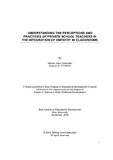Understanding the perceptions and practices of private school teachers in the integration of empathy in classrooms

View/
Date
2019-11Publisher
Brac UniversityAuthor
Salauddin, Mehtaz IslamMetadata
Show full item recordAbstract
This qualitative study focused on exploring the perceptions of private school teachers about the importance of empathy and to learn about their current practices regarding the integration of empathy in the teaching learning scenario. Empathy is vital for building strong interpersonal relationships and has been tied to positive outcomes in harmony and collaboration, in this era of globalization. In the light of the increase of violence, cruelty and the divide between people, the society as a whole can be characterized as facing an “empathy deficit”. It has become imperative to bring focus on the socio emotional development which in turn will aid in cultivating compassion, altruism and empathy. As children spend a significant amount of crucial time of their development in school it is vitally important for teachers to know about the importance of empathy and be able to empathize with children and their emotional needs. Children from 2 years of age may have the rudimentary level ability to cognitively interpret; experience and react to the physical and psychological states of others. Moreover, both nature and nurture play a role in shaping individual differences for children’s concern for others. So, it is essential for teachers to have empathy in order to model empathic behavior and to foster empathy. This qualitative study focused on understanding teachers’ values, beliefs, and language in relation to empathy. It was conducted in 2 private schools in Dhaka. 4 (2 from each school) non participatory classroom observation was conducted and in-depth interview of 2 teachers (1 teacher from each school) was conducted using a semi structured questionnaire, consisting of both convergent and divergent questions. Two major themes and seven subthemes emerged from the data. The two major themes are: (a) teachers’ knowledge and perception of empathy in teaching criticism distorts empathy, and (b) teachers’ expression of empathy in the teaching and learning scenario. Overall, the study found that most teachers showed understanding in knowledge of empathy and expressed varying degrees of empathy for children in the teaching learning scenario. Some teachers despite of having the knowledge cannot take actions to build positive relationships with children. The recommendations derived from this research study suggest that further large-scale study, on-going empathy and special education training for teachers and establishing encouraging and supportive school environment for teachers in regard to integrating empathy in classrooms.
